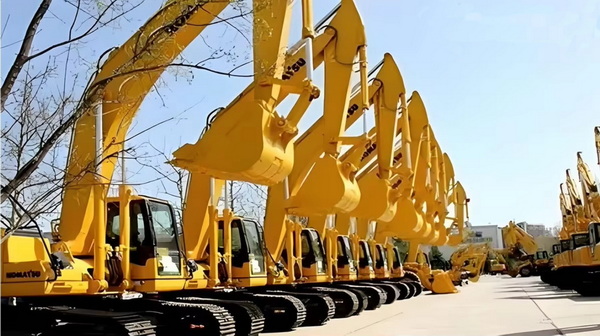Views: 222 Author: Amanda Publish Time: 2025-09-08 Origin: Site








Content Menu
● How Much Fuel Does a Mini Excavator Use Per Hour?
● Key Factors That Affect Fuel Consumption in Mini Excavators
>> Workload and Operating Conditions
>> Hydraulic System Efficiency
>> Operator Skill and Behavior
>> Machine Age and Maintenance
● Fuel Consumption: New Mini Excavators vs Used Excavators
● How Engine Technologies Affect Fuel Use
● Maintenance Best Practices for Fuel Efficiency
● Operator Tips for Fuel Savings
● Environmental and Economic Benefits of Reduced Fuel Consumption
● Why KeyChain Venture Co., Ltd. is Your Trusted Partner for Used Excavators
● Frequently Asked Questions (FAQ)
>> 1. How can I estimate the fuel consumption for my mini excavator accurately?
>> 2. Are used excavators less fuel-efficient than new models?
>> 3. What maintenance routines help reduce fuel consumption?
>> 4. Does operator behavior significantly affect fuel efficiency?
>> 5. What is the typical fuel tank capacity of a mini excavator?
Mini excavators have become indispensable machines in construction, landscaping, and various other industries. Their versatility, compact size, and efficiency make them an excellent choice for jobs requiring precision and mobility in tight spaces. However, one critical aspect that operators and fleet managers often consider is fuel consumption. Understanding how much fuel a mini excavator uses per hour helps in budgeting operating costs and enhancing productivity.
In this comprehensive article, we will explore fuel consumption in mini excavators, factors influencing fuel usage, comparisons with used excavators, tips to optimize fuel efficiency, and maintenance practices to reduce fuel costs.

A mini excavator is a smaller and more compact version of a full-sized excavator. Typically weighing between 1 to 6 tons, mini excavators are favored for projects where space is limited but performance cannot be compromised. They feature a hydraulic arm, a bucket, and a rotating platform mounted on tracks or wheels.
Due to their size, mini excavators consume less fuel than larger models, making them cost-effective for smaller jobs or urban construction projects. Their ease of transportation, maneuverability, and ability to operate in confined spaces contribute to their widespread use.
Fuel consumption varies based on the specific machine model, engine type, workload, and operating conditions. However, on average:
- Small mini excavators (1-2 tons) use between 0.5 to 1.0 gallons (1.9 to 3.8 liters) of diesel per hour.
- Medium mini excavators (3-4 tons) consume about 1.0 to 1.5 gallons (3.8 to 5.7 liters) of diesel per hour.
- Larger mini excavators (5-6 tons) have an average fuel consumption of 1.5 to 2.0 gallons (5.7 to 7.6 liters) per hour.
For example, a John Deere 35G mini excavator consumes roughly 0.7 gallons (2.6 liters) per hour under moderate working conditions.
These figures are a good benchmark but real-world fuel consumption will vary depending on how hard the machine is working. For example, digging in very dense soil or performing heavy lifting will increase fuel usage, while light tasks such as grading or trenching in soft soil will use less fuel.
Understanding what drives fuel consumption in mini excavators can help you optimize usage and cut costs. Here are the main factors:
The engine's size and horsepower rating influence baseline fuel consumption. Larger engines inherently consume more fuel but also produce more power. More powerful mini excavators can finish tasks faster, possibly offsetting higher per-hour usage.
Daily tasks range from continuous digging to intermittent work with idling periods. Fuel use spikes when the machine works at full throttle doing heavy excavation or lifting. Conversely, extended idling or standby periods waste fuel without productive output.
Environmental factors like temperature, altitude, and terrain also play roles. Cold weather demands more fuel for warming engines; high altitudes reduce engine efficiency; hilly terrain may increase power requirements.
Mini excavators use hydraulic systems to power arm and bucket movements. Older or poorly maintained hydraulic components leak or lose pressure, forcing the engine to run harder and consume more fuel. Advanced hydraulic designs with load-sensing systems improve efficiency by delivering exactly the needed power.
An experienced operator can minimize fuel use by reducing unnecessary movements, avoiding excessive idling, and choosing the right throttle settings. Operators familiar with fuel-saving techniques foster lower consumption without sacrificing productivity.
Used excavators often have higher fuel consumption if not properly serviced. Dirty filters, worn injectors, low-quality lubricants, or engine wear increase inefficiencies. Regular maintenance keeps engine, fuel, and hydraulic systems performing optimally and reduces fuel waste.
Many companies consider used excavators to reduce capital expenditure. However, it is important to understand how fuel efficiency compares:
- Older Used Excavators may run less efficiently due to wear on engine components, clogged fuel injectors, or outdated technology. This can lead to 5-15% higher fuel consumption compared to newer models.
- Well-Maintained Used Machines can perform closely to new excavators, especially if the previous owner conducted timely servicing and the machine is reconditioned before resale.
- Technological Advances reflected in new mini excavators include improved combustion systems, electronically controlled fuel injection, and enhanced hydraulic systems, all contributing to superior fuel economy.
When purchasing a used excavator, especially from trusted suppliers like KeyChain Venture Co., Ltd., it is advisable to review fuel consumption reports, maintenance histories, and to conduct on-site performance tests.

Modern mini excavators incorporate engine technologies aimed at maximizing fuel efficiency while complying with international emission standards. Some relevant technologies include:
- Common Rail Direct Fuel Injection: Allows precise fuel delivery for better combustion and reduced fuel use.
- Turbocharging and Intercooling: Enhances engine power without increasing fuel consumption proportionally.
- Idle Shutdown Systems: Automatically shuts off the engine after a set idle time to prevent fuel waste.
- Variable Speed Pumps: Adjust hydraulic flow based on load demand, lowering engine effort.
Understanding these technologies can help users select efficient models and reduce operating costs.
Maintaining a mini excavator properly not only prolongs its lifespan but also reduces fuel expenses. Key maintenance tasks include:
- Regular Engine Oil and Filter Changes: Use manufacturer-recommended oils and replace filters timely to ensure smooth engine operation.
- Air Filter Cleaning or Replacement: Clean air filters improve combustion efficiency and prevent engine strain.
- Fuel Filter Replacement: Keeps contaminants from disrupting fuel injectors and combustion chambers.
- Track or Tire Maintenance: Correct track tension or tire pressure reduces rolling resistance, helping conserve fuel.
- Hydraulic System Checks: Inspect hoses and seals for leaks; replace worn parts to maintain hydraulic efficiency.
Companies should adhere strictly to service intervals stipulated by manufacturers and keep detailed maintenance logs, especially for used excavators.
Operators can greatly influence fuel consumption through daily practices:
- Avoid Excessive Idling: Shut down the engine when waiting longer than a minute.
- Smooth and Strategic Movements: Avoid rapid or jerky arm movements causing engine strain.
- Use Economy or Eco Modes: Engage these modes where available to optimize engine settings for fuel savings.
- Monitor Load and Torque: Avoid overloading the bucket or boom, which increases fuel demand.
- Plan Work Efficiently: Organize tasks to minimize repositioning and machine travel.
Regular fuel consumption monitoring and feedback to operators can help promote fuel-saving habits.
Minimizing the fuel requirements of mini excavators leads to multiple benefits:
- Lower Operating Costs: Fuel is a significant expense, so efficiency directly improves profitability.
- Reduced Carbon Footprint: Diesel engines emit CO2 and other greenhouse gases; using less fuel helps meet environmental regulations.
- Less Noise and Pollution: Efficient engines often produce fewer emissions and operate quieter.
- Extended Equipment Life: Efficient operation means less wear and tear on engine components.
Thus, investing in fuel-efficient machines and proper operating practices aligns with both sustainability goals and business success.
As one of China's leading commercial vehicle suppliers, KeyChain Venture Co., Ltd. offers a wide range of reliable, high-performance mini excavators and used excavators tailored to domestic and international clients.
- Our used excavators are thoroughly inspected and maintained to ensure fuel efficiency and operational integrity.
- We provide machines that meet different project needs while keeping lifecycle fuel costs manageable.
- Expert consultation and after-sales service ensure customers optimize their equipment's performance.
Choosing KeyChain guarantees a balance of cost-effectiveness, reliability, and environmental responsibility.
Mini excavators are vital tools across numerous industries, prized for their compactness and versatility. Fuel consumption is a key factor influencing operational budgets and environmental impact. On average, mini excavators consume between 0.5 to 2 gallons of diesel per hour, depending on size, workload, and condition.
Understanding factors such as engine technology, hydraulic efficiency, operator skill, and maintenance can dramatically reduce fuel use. Used excavators remain a practical option provided they are selected wisely and maintained properly to ensure competitive fuel efficiency.
By combining efficient machines with smart operators and regular upkeep, businesses can enjoy cost savings, improved productivity, and contribute to greener construction practices. For those seeking dependable used excavators, KeyChain Venture Co., Ltd. offers trusted solutions with transparent fuel performance records.

You can estimate fuel use by referring to the manufacturer's specifications and then monitoring the actual fuel consumption during typical working hours. Installing fuel tracking devices or using machine telematics aids precise measurement.
Used excavators may have higher fuel consumption if not properly maintained. However, well-serviced used machines from reputable sellers perform nearly as efficiently as new ones, especially when they feature recent engine technology.
Essential routines include regular oil and filter changes, cleaning air and fuel filters, maintaining proper track tension or tire pressure, inspecting and repairing hydraulic leaks, and tuning the engine per manufacturer recommendations.
Absolutely. Trained operators who minimize idle time, avoid excessive engine revving, use eco modes, and plan work efficiently can reduce fuel consumption by a notable margin.
Fuel tank sizes vary by model and can range from approximately 10 gallons (38 liters) for smaller machines to 25 gallons (95 liters) for larger mini excavators.
Field Visit To DR Congo – Products in Action, Friendships in Progress
Treat Your Team to the Perfect Ending: A Cultural Day & Rejuvenating Massage
Just received this absolutely gorgeous bouquet specially ordered by our lovely customer!
Truly inspiring conversations today with our highly insightful client!
Today, we visited the bus company together with our client. It was really wonderful!
A Milestone Moment: Custom Buses Successfully Shipped, Setting Course for New Horizons
Forging Stronger Ties: Welcoming Key African Partners to Chongqing for Transport Collaboration